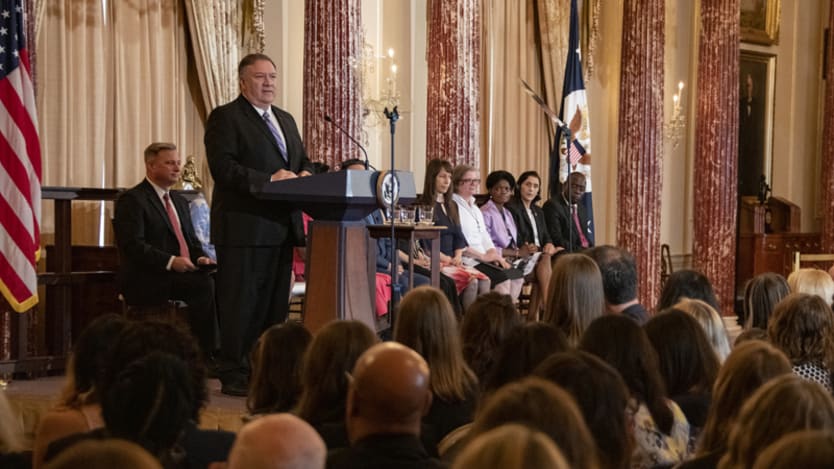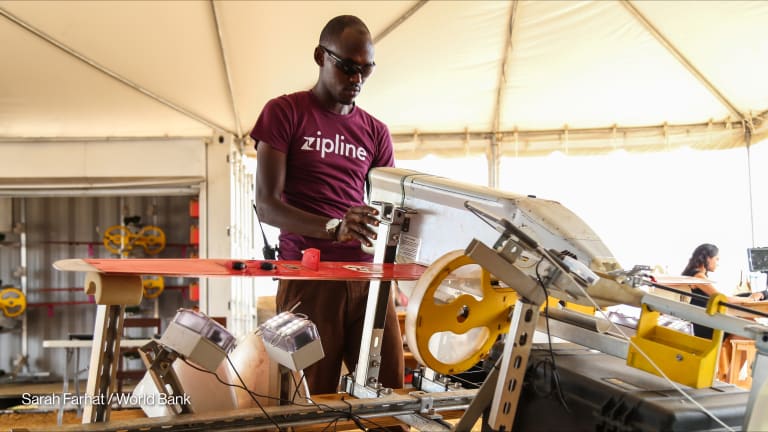
WASHINGTON — The U.S. State Department launched its 2019 “Trafficking in Persons Report” Thursday, against a backdrop of uncertainty brought on by the Trump administration’s decision to dramatically restrict funding to countries at the highest tier of trafficking concern.
While the White House has sought to put political weight behind a policy some say was previously rendered “toothless,” aid organizations in countries affected by trafficking-related sanctions have complained about a “haphazard” process that has left them guessing about whether their programs will be allowed to continue or not.
The TIP report designates countries into different tiers, according to the actions their governments are taking to prevent trafficking, prosecute traffickers, and protect victims. “Tier 3” countries — those that are not meeting the “minimum standards” in these criteria — are subject to aid restrictions, unless the White House grants them a waiver. The Trump administration has taken a far stricter position on issuing waivers than in the past.
“We're trying to figure out how to make sure that important programs that are doing good work can still be funded.”
— John Richmond, U.S. ambassador-at-large for trafficking in personsNow that the 2019 report has launched, it will initiate a new round of decisions about which tier 3 countries should receive waivers, and U.S. officials acknowledge they have room for improvement in implementing that process.
“We want to make sure that there's clarity and there's consistency across the board. We want to make sure that the countries can expect and have some confidence in what's going to happen,” said John Richmond, U.S. ambassador-at-large for trafficking in persons.
“This is a newer process. We're trying to make sure that we do it the right way, and we're moving as fast as we can,” Richmond told Devex in an interview.
The Trump administration — and Ivanka Trump in particular — have sought to elevate enforcement of the Trafficking Victims Protection Act, a law that has been on the books since 2000.
Exclusive: 'Haphazard' White House crackdown on human trafficking disrupts aid
The Trump administration's push to restrict aid to countries that are not doing enough to combat human trafficking has left development programs hanging. One U.S. lawmaker is worried the crackdown could impede efforts to combat Ebola.
While 18 of 23 tier 3 countries received full or partial waivers to receive U.S. assistance in 2017, only four of 22 received them in 2018, according to Richmond. President Trump laid out those restrictions in his Nov. 29 “presidential determination,” and aid officials and implementing partners have been scrambling to understand their implications ever since.
Restrictions to tier 3 countries are meant to apply only to nonhumanitarian and nonlife saving assistance, but the definition of what is included in those categories is not entirely settled.
“Obviously smart people can make arguments on both sides of that issue as they try to apply it in each individual circumstance,” Richmond said.
“That's part of the process that [we are] undergoing. I think we're going to hopefully do a better job, a faster job as we move forward into the 2019 tier 3 countries as we think about this,” he said.
The restrictions are intended to apply to assistance that goes directly to tier 3 governments, but can also apply to funding channeled through NGOs if the programs they operate are deemed to be benefiting the government, Richmond explained.
At the U.S. Global Leadership Coalition State Leaders Summit on Monday, a representative of the International Rescue Committee told attendees that the organization has been advised not to work with the government of the Democratic Republic of the Congo on a health systems strengthening project, for example.
“We're trying to figure out how to make sure that important programs that are doing good work can still be funded — and to apply pressure on countries to take their issue of trafficking seriously and to improve their efforts to meet the minimum standards,” Richmond said.
Several U.S. lawmakers have expressed concerns that the Trump administration’s decision to crack down on issuing assistance waivers could have serious unintended consequences — including for the Ebola response effort in DRC. While the U.S. Agency for International Development plans to expand its programs and build trust with communities affected by the outbreak, some lawmakers have questioned whether that will be possible given the White House’s decision to block funding to the country.
Some of those lawmakers have even introduced legislation aimed at clarifying the USAID administrator’s authority to implement necessary programs.
“It’s clear that additional funding would complement the current outbreak response. It would be complementary. It would build capacity. Once we get a final ruling on that, we’ll see where we stand and we’ll press ahead,” Tim Ziemer, acting assistant administrator for the bureau for democracy, conflict, and humanitarian assistance at USAID, told a congressional committee earlier this month.
The 2019 TIP report saw more countries downgraded than upgraded. Bhutan, Cuba, the Gambia, and Saudi Arabia were added to the list of tier 3-designated countries, while six others moved from tier 1 to tier 2.
“It's a strong change in approach to use the law more aggressively. For years people criticized the Trafficking Victims Protection Act saying that it was toothless, saying that the waivers meant that we weren't following congressional intent. Now we want to make sure that we're using the law as it was constructed,” Richmond said.
The key, he added, will be “making sure that we are thoughtful about [taking] a case by case approach to each individual funding piece.”
“In prior years we haven't had to do that analysis as often, and now we're having to do it more, and want to make sure we do it right,” he said.








